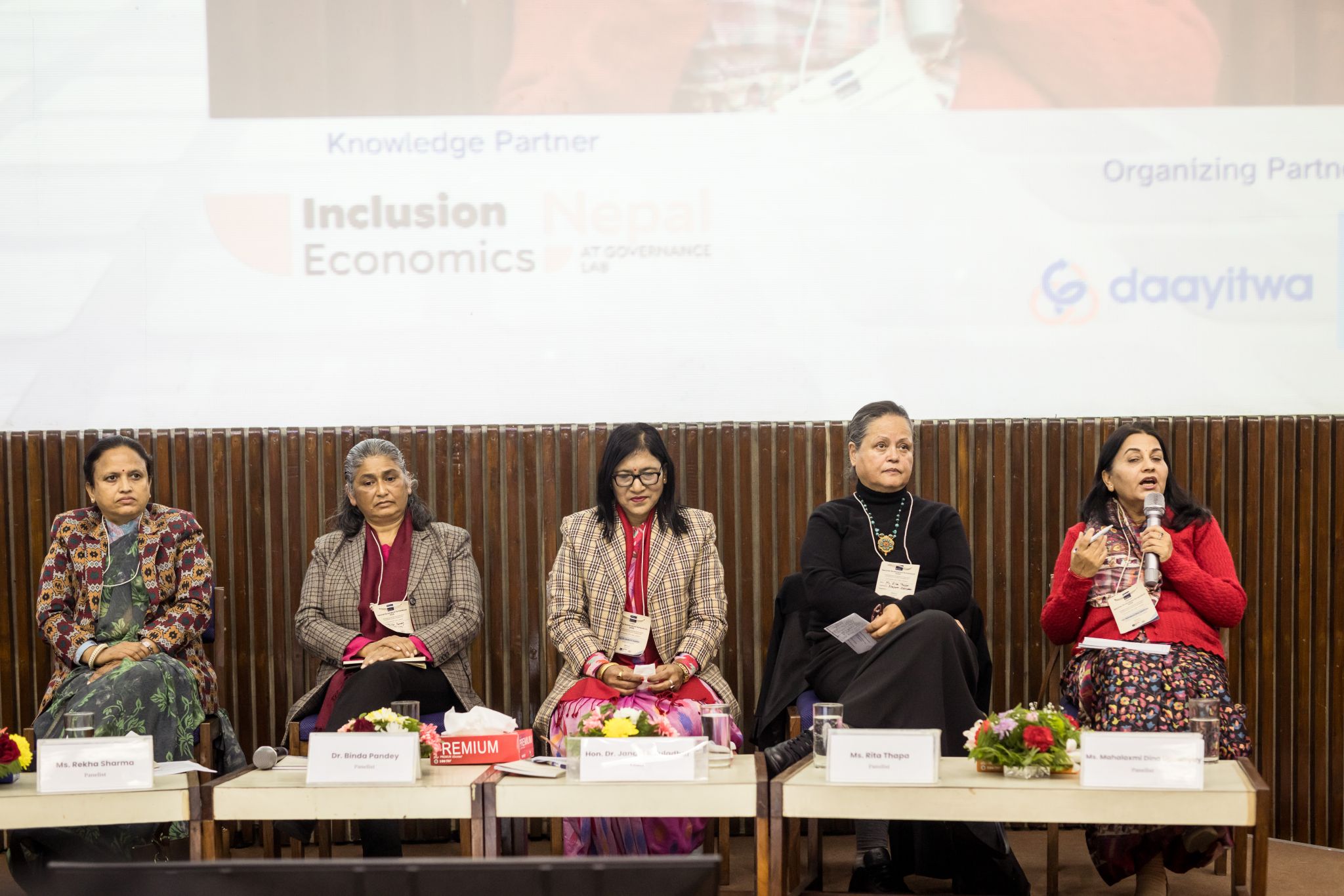Event Recap: Insights for Enhancing Women's Political Participation in Nepal’s Local Elections
As part of the Nepal National Governance Symposium, Inclusion Economics Nepal led a 2-hour plenary session on December 20, 2024 that brought together a group of distinguished female leaders and thinkers to discuss barriers to women’s political representation in Nepal.

by Jenna Allard, Ayush Jain, and Pratigya Adhikari
Nepal’s 2015 Constitution ushered in dramatic political transformation and some of the world’s most progressive gender quotas for politicians at the federal and local level. Despite significant progress, women remain underrepresented in local governments. In this panel, some of the country’s most esteemed advocates for gender equality discussed how to bolster women’s political leadership through collective action and institutional reform.
Governance Lab in collaboration with National Administrative Staff College (NASC) organized the National Governance Symposium 2024, focusing on the theme of “Strengthening Subnational Governance for Inclusive Economic Development”. On December 19 and 20, 2024, the symposium brought together over 220 participants, including government officials, entrepreneurs, researchers, and activists.

Mahalaxmi Dina Upadhyay (right) speaks during the panel on how to build more gender-inclusive political institutions in Nepal.
Launched in 2022, the National Governance Symposium aims to foster discussions to drive governance innovations and inclusive development in Nepal. This year, the Symposium received support from several critical government partners, including the Office of the Prime Minister and Council of Ministers, National Planning Commission, and the Ministry of Finance. Among the six panel during the event, Inclusion Economics Nepal organized a 2-hour plenary session on federalism and women’s inclusion in Nepali politics.
Dr. Prabin B. Khadka, Assistant Professor in the Government Department at the University of Essex, opened the session by sharing insights from Inclusion Economic Nepal’s past work that contrasted declining representation by women politicians in local government with candidates’ growing aspirations and leadership experience. Panelists then highlighted their thoughts on how to build more gender-inclusive political institutions in Nepal:
- Ms. Pratigya Neupane, Program Coordinator at NARMIN, highlighted how gender stereotypes can limit women’s opportunities, and spoke about an innovative new project to build collective action and empowerment through local cross-party networks. NARMIN plans to rigorously evaluate the effectiveness of this program in partnership with researchers from Inclusion Economics Nepal.
- Ms. Mahalaxmi Dina Upadhyay, Joint General Secretary of Nepali Congress, recounted how a lack of confidence from political party members can restrict opportunities for women politicians to take on leadership positions. She highlighted the value of women’s wings in mobilizing women within parties, and stated that, “political engagement should not only be about winning an election for women, but about feeling secure to fight for their rights and their positions.”
- Ms. Rekha Sharma, Standing Committee Member of CPN (Maoist Centre) and Member of Parliament, stressed the importance of enforcing and reforming Constitutional gender quotas in Nepal, to guarantee representation at the local level.
- Dr. Binda Pandey, Former Member of the House of Representatives, Communist Party of Nepal - United Marxist Leninist, stressed the importance of ensuring representation for women at the grassroots: while 41% of politicians in Nepal are women, they represent only 30% of ward positions. She echoed the need to include more women on political party committees that vet and select candidates.
- Ms. Rita Thapa, a prominent feminist educator, community activist and founder of Tewa, noted that women politicians can partner with civil society to directly tackle discrimination and patriarchy, and build a nation “led by capable daughters.” She stated that male politicians “attempt to dominate women and perceive feminism as a threat is a key patriarchal tactic, often resulting in capable women politicians being restricted to constituencies where their chances of winning are minimal.”
Hon. Dr. Janaki K. Tuladhar, Election Commissioner and session chair, summarized the Election Commission’s ongoing efforts to elevate women’s political participation while concluding that insights from the session would be taken into consideration for fostering more inclusive participation in elections.
Inclusion Economics Nepal researchers are working to tackle many of the issues raised in this panel directly by partnering with political parties and civil society organizations to empirically quantify the factors that constrain female political participation and propose innovative solutions.
Read more about Inclusion Economics Nepal’s ongoing work on the impact of political transformation on candidate selection in Nepal and uncovering barriers to women’s political leadership in Nepal.